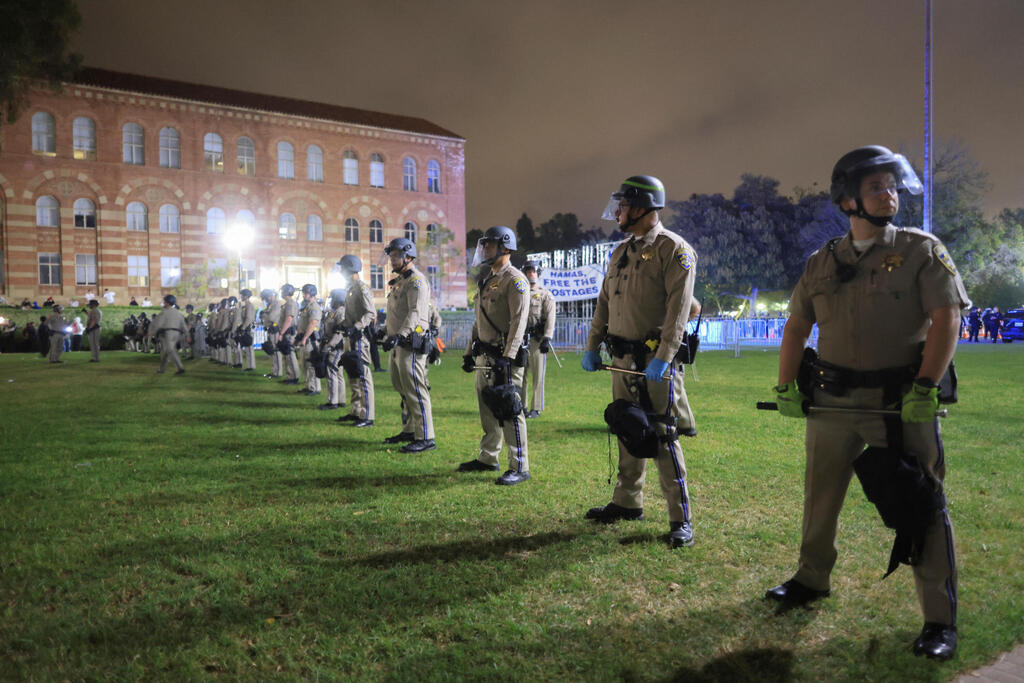When Donald Trump was elected President of the United States, he vowed to penalize academic institutions that failed to curb "rampaging lunatics and Hamas supporters." In the wake of this declaration, a growing number of universities across the U.S. and Canada have turned to Israeli security firms—or companies with ties to Israel—to handle the surge of pro-Palestinian protests on their campuses.
Confrontations erupt at UCLA
(Video: Reuters)
One of the most prominent examples is the City University of New York (CUNY), which has recently become a focal point for such protests. In response to escalating tensions, the university approved a $4 million security contract with *Strategic Security Corp.*, a company owned by Joseph Sordi, a former NYPD officer and Mossad alumnus. Sordi has proudly touted his professional training in Israel, and the company’s website highlights that its security managers undergo "formal training" in Israel.
In a public statement, Strategic Security Corp. described the campus climate as being overrun by "a surge of pro-Palestinian protesters infiltrated by seasoned propagandists who employ guerrilla warfare tactics of non-permissive asymmetrical resistance, actively opposing, inciting crowds, and sparking violence and chaos." The company assured that it would leverage its "capabilities and expertise to identify and monitor threats, deploy effectively, and maintain a robust, manned security force."
CUNY defended its decision by citing the "unsafe and hostile" conditions within pro-Palestinian protest camps, which reached a boiling point last April when clashes with the NYPD led to mass pepper spraying. Over 170 people were arrested, and several students suffered injuries, ranging from broken bones to lost teeth, requiring medical intervention.
Similar tensions erupted in Montreal, where students rallied in the streets chanting "globalize the intifada" in protest against Concordia University’s decision to hire two Israeli security firms. One of them is Perceptage International, which is run by Israeli Defense Forces veterans. Perceptage International is headed by Adam Cohen, a former chief security officer of the Jerusalem District Court.
Meanwhile, UCLA saw its own share of controversy last May when violent clashes broke out on campus. Protesters alleged that security guards from the Israeli firm Magen Am, staffed with individuals with military backgrounds, acted aggressively toward them. UCLA later admitted that the company had been hired to assist with policing the protests and had worked in coordination with local law enforcement, receiving $1 million in city funds for its services. Additionally, the American security firm Contemporary Services Corporation—which operates an exclusive branch in Israel—was also contracted to manage campus security and address protest hotspots across Los Angeles.
2 View gallery


Confrontations between police and pro-Palestinians at UCLA
(Photo: Etienne LAURENT / AFP)
The involvement of Israeli-linked security firms has highlighted the U.S.’s growing reliance on Israel’s expertise in the private security sector. Many of these companies employ former members of Israel’s security establishment, including veterans of intelligence units, IDF, and Shin Bet. Their extensive operational experience in Israel is often seen as a valuable asset for universities seeking swift solutions to rising campus unrest.
Get the Ynetnews app on your smartphone: Google Play: https://bit.ly/4eJ37pE | Apple App Store: https://bit.ly/3ZL7iNv
However, reliance on Israeli expertise has not gone without criticism. Protesters and student organizations argue that the presence of firms with Israeli security backgrounds exacerbates existing political tensions. At Concordia, for instance, outraged students claimed that hiring Israeli-linked security firms "adds fuel to the fire" and erodes trust within the academic community. They issued demands for the university to immediately terminate its contracts with these companies and divest from any direct or indirect financial ties to Israel. Concordia, however, defended its decision, stating that the hiring of these firms was purely motivated by the need to ensure campus safety in light of potentially escalating protests, insisting that it had no connection to Israel.
This unfolding situation paints a complex picture of how universities are grappling with growing unrest, while also drawing scrutiny for the methods and partnerships they choose to maintain order. As protests intensify, the debate over the role of Israeli security firms in North America is unlikely to subside anytime soon.





